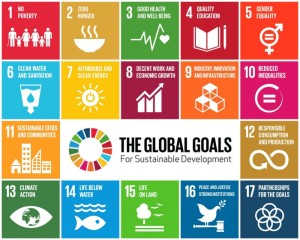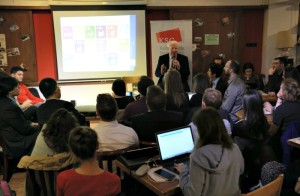

March 22nd, 2016 Bridge Cafe (Wudaokou)
Speakers:
Klaus LEISINGER, Professor of Sociology, University of Basel; President, Global Values Alliance; Senior Adviser, Karl Schlecht Foundation.
LIU BAOCHENG, 刘宝成, Director of the Center for International Business Ethics at the University of International Business and Economics (UIBE, China).
Presentation
In an increasingly interconnected world, decisions about economic, social or economic issues taken in New York, Berlin or Beijing will affect the life and future of people living elsewhere on the planet. Looking for business solutions through an exclusively economic magnifying lens (i.e. cutting costs and increasing profits), without considering the social and environmental consequences of such decisions, has pushed the carrying capacity of the world to the limits. Last year in September 2015 the General Assembly of the United Nations adopted the “2030 Agenda for Sustainable Development”, a “plan of action for people, planet and prosperity” listing seventeen goals that national governments and individual citizens must follow for transforming the world into a more equal, freer and better place to live for today´s and future generations.

Being directly involved as senior advisor to the United Nations system, among others, for the UN Global Compact, the UN Sustainable Development Solutions network and the Consultative Group on International Agricultural Research, professor Klaus Leisinger joined the 50th talk of ThinkIN China for highlighting the challenges of corporate sustainable responsibility. Professor Liu Baocheng, Director of the Center for International Business Ethics at the University of International Business and Economics of Beijing, shared his views on the same subject from a Chinese perspective.
“What’s the world I want to leave to the next generation?
First of all, for changing the unsustainable “business-as-usual-path” the corporate decision makers of the world are currently following, a new business mindset is needed. The overall issue for business people is a finance and marketing myopia, its equivalent for politicians is a “re-election-myopia”: All important decisions taken today are predominantly subordinated to the sole objective to obtain results in the short-term. Sustainable development requests a different approach, one that does not seem to fit into today´s economic and political syllogism: investing something today for a return on investment that is coming along in 15-20 years and that will affect the life of our descendants and of people living far away from today´s economic and political stakeholders. Only through an inter-generational awareness will a moral obligation of such a kind become perceivable. The hope is that human beings all over the world in all their professional and private roles will increasingly accept responsibility for sustainable development and start to act coherently in their sphere of influence, in a spirit of shared values and shared responsibility.
“There is a price to pay for integrity, but look at it as an investment, and not as an expenditure”
“Business has a pivotal role to play in the 2030 Agenda for Sustainable Development” as UN General Secretariat Ban Ki-moon stated: significant results will only be achievable if and when companies go further than today´s business as usual. They must start to integrate the Sustainable Development Goals (and 169 targets) into business strategies and research strategies and come up with innovative products and services.

Sustainable development is a complex process and cannot be achieved through a single act – like e.g. end-of-the-pipe environmental protection. Sustainable development thinking must guide the entire management process. Acting with integrity from the top, walking the talk and being an example for all the employees will motivate and commit employees and suppliers to sustainable corporate policies. To measure progress made, different performance indicators, different targets and new incentive structures are in need: If top management gives credit and rewards only those who bring in more turnover and less costs there is not much of an incentive to focus on environmental costs or social disparities, i.e. the system won’t change.
Communication is key
Companies are always willing to report on their successes and to give the impression that they are “the best”, “outstanding”, “excellent”. They shy away to report about unsolved problems, set-backs, obstacles and dilemmas. But then: Only through an open and transparent communication about the whole picture, communication where different stakeholders can actively participate and all actors involved can share different knowledge, skills, experiences and resources that benefits the entire system – only through such a communication can society as a whole go jointly on a learning curve. The business world, civil society, academia and governments must all be involved in shaping sustainability.
China’s role
China’s corporate history is very short: the first Chinese corporate law dates back only to 1984. The burdens of the planned economy, where companies were not entitled to make independent decisions and to act according to the market, left China today with a huge gap to fill in corporate behavior. Of the sixty million companies registered in China, only 3.4% are State Owned Enterprises, but they still control 47% of total assets. In the last few decades, hundred of thousands of foreign companies relocated in China, attracted by cheap and abundant labor force and lower environmental and social standards, transformed China into the “world factory”. The economic success and the creation of hundreds of millions of new, productive jobs are known – but so are the costs and damages caused by this phenomenon.
As China becomes more interconnected with the world, rising as the second biggest economy, it has, as Professor Liu explained, to learn new rules and start to respect higher standards. In professor Liu’s words, China is willing to bear more responsibilities. However, it still needs to reach two main goals: an efficient market and an effective government, from the highest level of the leadership down to local officials. The bureaucratic machine must be re-dimensioned, reducing expenditures and easing up procedures. Economy itself will have to move from a nearly exclusively export-led model to a predominantly consumption one. But then this cannot be achieved in the short term, as Chinese people will maintain high saving rates as long as social welfare won’t be strengthened. Education is key in this transformation: investing on the talents of tomorrow as well as sharing sustainable development values such as non-violence and respect for life, solidarity and just economic order, tolerance and truthfulness, equal rights and mutual esteem. This will provide China – and the world – with new brand of businessmen and -women, officials and scientists aware that every decision and action has a sustainability dimension.
The question is no longer “will things change?” if and when we continue with business as usual. The only really important question is: we will be able to influence the rate and structure of change or we will wait until confronted with catastrophes and crises that impose emergency action without any degree of freedom?
Today we still have the choice: the earliest we start, the more we can do and the less expensive it will be in economic, social and political costs.
Written by Martina Poletti